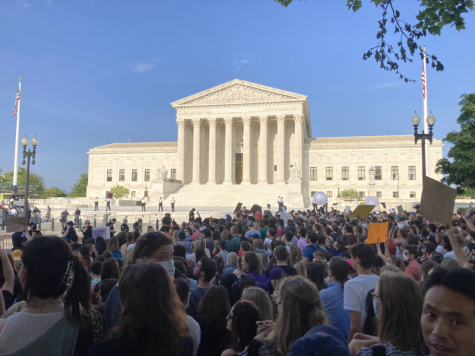SCOTUS draft opinion to overturn Roe v. Wade leaked
May 11, 2022
In an unprecedented occurrence, a draft of a Supreme Court opinion was leaked to the media on the night of May 2, detailing the Court’s current stance to overturn Roe v. Wade. The previous court case, decided in 1973 under Chief Justice Warren E. Burger, protected the liberty of Americans to choose to have an abortion without excessive restriction by the government.

The draft opinion, which was published by Politico after being leaked by an unknown source, is in response to the current case of Dobbs v. Jackson Women’s Health Organization. The case began in Mississippi, where the state argued that a fetus could feel pain during an abortion after 15 weeks. The district court which originally heard the case sided with the Jackson Women’s Health Organization, although the Mississippi Department of Health has continually appealed the case to the Supreme Court. It was argued in front of the court on December 1, 2021.
The opinion, written by Justice Samuel Alito, states that “Roe was egregiously wrong from the start. Its reasoning was exceptionally weak, and the decision has had damaging consequences. And far from bringing about a national settlement of the abortion issue, Roe and Casey [referring to Planned Parenthood v. Casey, which reaffirmed the decision in Roe] have enflamed debate and deepened division.” In the opinion Justice Alito repeatedly makes the claim that there is no right to an abortion enshrined in the Constitution.
He makes the argument that the right to an abortion does not fall under the due process clause of the 14th amendment which guarantees the right to be treated fairly by the government when the right to liberty is at risk. Stating that “any such right must be “deeply rooted in this Nation’s history and tradition” and “implicit in the concept of ordered liberty.” (Washington v. Glucksberg, 521 U. S. 702, 721 (1997).4)
Alito again on page 30 of his opinion makes the case that the abortion is not a constitutional right and is not protected by the right to privacy or the right to liberty rather that elected representatives should decide how abortion is regulated. He also repeatedly mentions states’ opinions as a collective with his opinion’s earlier pages, stating that 26 states have requested the Supreme Court to overrule Roe v. Wade, mentioning it on page 30 as how voters in states may differ severely on their opinions. This could imply Alito’s desire for abortion to be decided on a state by state basis.
Stare decisions refer to the legal principle that the past precedent should be followed. Alito states several instances where the Supreme Court revisited and changed past precedent, and it benefited the United States, citing notably the overruling of Plessy v. Ferguson’s ruling of separate but equal being constitutional.
Roe’s decision argues that the right to an abortion falls under the right to privacy, specifically the “right to shield information from disclosure and the right to make and implement important personal decisions without governmental interference.” He argues the first right is irrelevant in this case and the second is too far-fetched to be applicable.
Throughout the opinion, he pushes the idea that the Roe decision is written more as legislation based around policy rather than reflecting the rights guaranteed to citizens of the United States in the Constitution.
“We therefore hold that the Constitution does not confer a right to abortion. Roe and Casey must be overruled, and the authority to regulate abortion must be returned to the people and their elected representatives.”
He adds that further legal challenges could be brought in relation to the health of the mother. This means that policy that seeks to ban abortion outright, including cases of a mother’s life being at risk, could be challenged and struck down.
“We end this opinion where we began. Abortion presents a profound moral question. The Constitution does not prohibit the citizens of each State from regulating or prohibiting abortion. Roe and Casey arrogated that authority. We now overrule those decisions and return that authority to the people and their elected representatives. The judgment of the Fifth Circuit is reversed, and the case is remanded for further proceedings consistent with this opinion.”
The Court is set to release an official decision early this summer, though the integrity of the process has been called into question by the leak, which was the first time that any draft decision of the Supreme Court has been leaked prior to the Court’s official release of the final opinion. The Court has launched an investigation to find the party responsible for releasing the 98-page-document.







